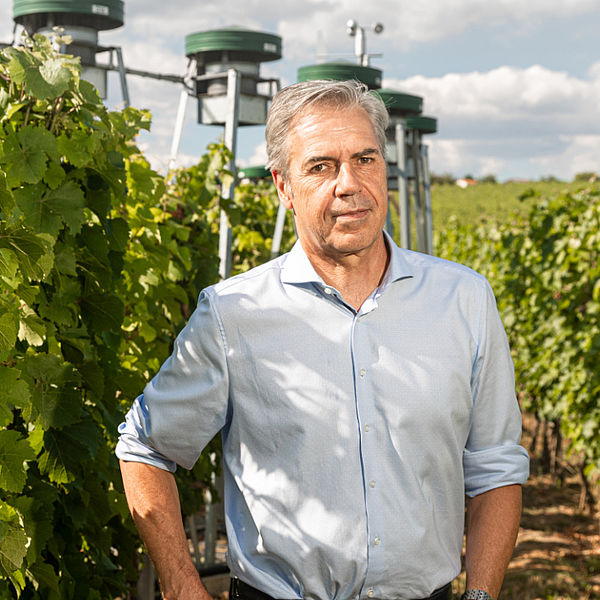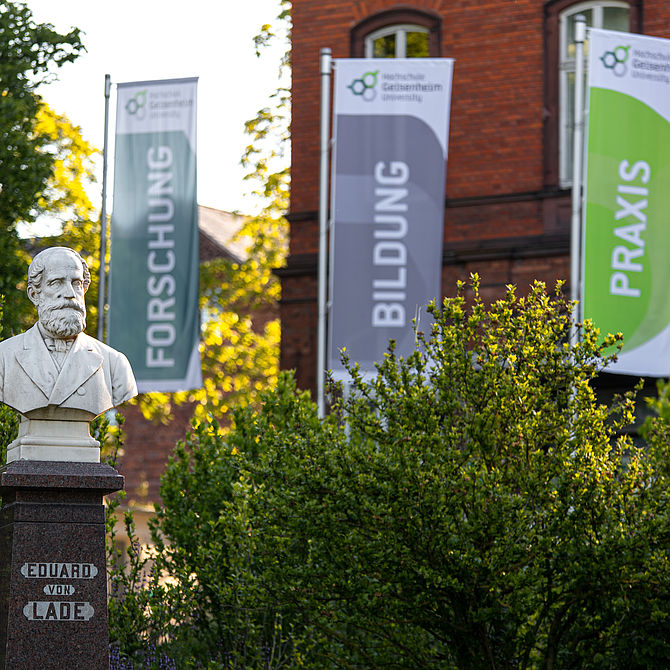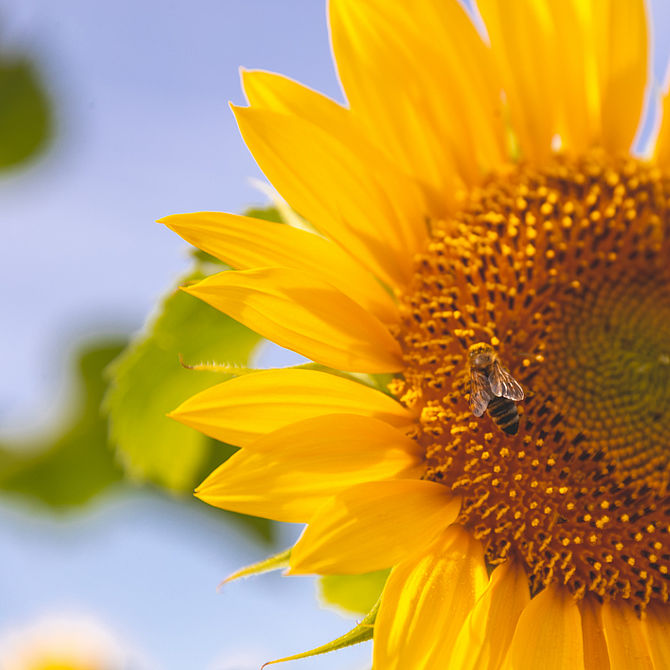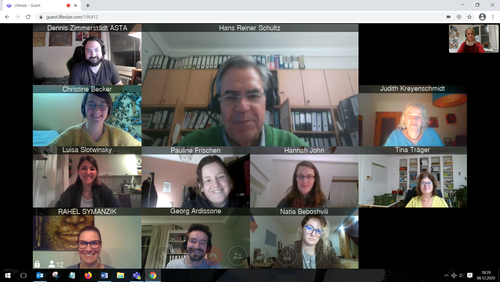Sustainability at Hochschule Geisenheim University
Hochschule Geisenheim University aims to integrate principles of sustainability into the university development process. For this purpose, the department "Strategic University Development and Sustainability" was established as a central coordination and steering unit. The department is responsible for implementing a holistic approach (Whole Institution Approach) to sustainable development at the university and defining sustainability goals. This is done transparently, with broad participation and with the intention of strengthening existing commitment. This comprehensive approach includes five areas of action: university administration/governance, operations, teaching & student affairs, research and transfer. Our goal is to make the entire university as resource-efficient as possible.
The central plattform to shape our sustainable university is the Green Office (sustainability office), which enables participation of all university members and raises awareness for holistic sustainability.
Our Definition of Sustainability
At Hochschule Geisenheim University, we understand sustainability and a sustainable development as “meeting the needs of the present without compromising the ability of future generations to meet their own needs” – a definition from the Brundtland Report published in 1987. Our efforts to make the university more sustainable are guided by the integrated sustainability model: what can be implemented within planetary boundaries (ecology) and in a socially just (social) and economically efficient manner (economy) is considered sustainable. In addition, we are guided by the 17 Global Sustainable Development Goals (SDGs) of the United Nations and the UNESCO program “Education for Sustainable Development: Towards achieving the SDGs” (ESD for 2030).
The German Federal Ministry of Education and Research (BMBF) describes Education for Sustainable Development (ESD) as empowering people with the knowledge and skills to make informed decisions and sustainable choices. For each and every one of us, it is all about understanding the impact of our actions on our own generation around the world and on future generations. We all need to be aware of our responsibility and make sustainable decisions based on that awareness.
Institutions that follow a whole institution approach integrate ESD principles (Education for Sustainable Development) into all areas of higher education: in courses, learning processes and methods. In addition, the institution raises awareness for the conscious use of energy and resources and empowers students and staff to make sustainable choices. In this context, teaching and administrative staff can attend trainings and programs, and all members of the university are involved in decision-making processes. In addition, institutions with a holistic approach cooperate with local communities and other partners and civil society associations.
We must use all the resources we have to make our planet a greener, fairer and more positive place to live. Challenges such as food security, climate change, resource efficiency and environmental protection can only be met with global cooperation, smart ideas and clever minds, and dedication and commitment on a small and large scale.

Fair Trade
Striving to Become a Fair Trade University
Hochschule Geisenheim University is working towards a Fair Trade University certification, which is awarded by the “TransFair Association for the Promotion of Fair Trade in One World”. What started out as a student initiative has turned into a cross-university project group involving students, scientific and administrative members of staff as well as professors. The group is chaired by University President Prof. Hans Reiner Schultz.
The project group brings together interested members of the university, and communicates the topic both internally and externally. They organize initiatives and make sure that all requirements are met. But the group even wants to go one step further and raise awareness of subjects such as green production, sustainability, food waste and resource efficiency.
What does 'Fair Trade' mean?
Clothing, coffee, fruit or vegetables – by choosing Fairtrade products, consumers can make a difference. Our choices help to make sure that people who produce, process, transport and sell our products are paid a fair price. Quite often, farmers and workers only receive a tiny share of what we pay for their products. By making production costs, wages and value chains more transparent, different initiatives aim to make trade fairer and more sustainable and promote solidarity.
Fairtrade means:
- fair minimum prices so that all people along the value chain can earn a good living
- long-term and reliable trade relations
- protecting the right of workers and children; no child labour
- promoting environmental protection during cultivation, production and processing
In addition, communication and raising awarness are other important factors that Hochschule Geisenheim University wants to promote.
In the Cafeteria
- Coffee
- Tea
- Charitea
- Lemonaid
Merchandise Products
- Cotton carrier bags
- AStA hoodies
- Prof. Dr. Hans Reiner Schultz – President, chairman of the group
- Sébastien Loison – Head of the Cafeteria
- Natia Beboshvilli – Student
- Pauline Frischen – Student, member of the Student Parliament
- Luisa Slotwinsky – Student
- Rahel Symanzik – Student
- Dennis Zimmerstädt – Student, AStA chairman
- Prof. Dr. Judith Kreyenschmidt – Professor for Quality & Fresh Produce Processing
- Georg Ardissone, M.Sc. – Department of Applied Ecology
- Dr. Christine Becker – Department of Crop Protection
- Jutta Gadamer – Team ProDUAL
- Hannah John, M.Sc. – Department of Fresh Produce Logistics
- Dipl.-Ing. Agr. Eike Kaim – Department of Wine and Beverage Business
- Julia Baumberger, M.A. – Head of Event Management
- Alina-Louise Kramer, M.A. – Communications and University Relations


Fair Trade FAQ
Fair Trade includes much more than just monetary aspects. The World Fair Trade Organisation (WFTO) has defined 10 principles of Fair Trade:
- Creating opportunities for economically disadvantaged producers
- Transparency and accountability
- Fair Trading Practices
- Payment of a Fair Price
- Ensuring no child labor and forced labor
- Commitment to Non Discrimination, Gender Equity and Women’s Economic Empowerment and Freedom of Association
- Ensuring good working conditions
- Providing capacity building
- Promoting fair trade
- Respect for the environment
Conscious Use of Food and Resources
Why should we care about food waste?
In Germany, 55 kilos of food per capita end up in the waste every year even though half of it is still good, according to the 2020 Food Report by the German Federal Ministry of Food and Agriculture. But this is not the only problem: in 2016, 21.6 % of fruit and vegetables and nearly 12 % of meat and animal products were lost or wasted between harvest and retail. The production of these foods required a lot of resources - water, energy, time – which were ultimately wasted.
As of now, we are using up our planet’s resources far too quickly. Within just eight months, we will have used up all the resources that the Earth can generate during one year. In light of global hunger and water shortages, this excessive consumption has severe consequences. That is why we are raising awareness about the urgent need to use resources wisely, and conducting research to protect them.
Top Ten Tips to Reduce Food Waste
1. Shop smart and plan ahead
Check your fridge and plan wisely: Are you eating out this week or having friends over for dinner? Make a list of what you need to buy and stick to it.
2. Take your time
We tend to buy more than we actually need when we are hungry or in a hurry. Take your time and choose products wisely to avoid impulse buys and reduce food waste.
3. Don’t buy in bulk
People often think that buying products in bulk saves money, but quite often this is not true. To reduce food waste, consider buying products in smaller quantities, especially if you live alone.
4. Buy “ugly” food
Many products in the supermarket are often wasted because they are not perfect. Do your part by choosing imperfect produce in the supermarket or leftover bread at the local bakery. Quite often, these products are also offered at a discount.
5. Organize your fridge correctly
Perishable items, such as meat, should always be kept cold, so put them in the fridge as soon as you buy them. Fruits and vegetables can be stored in the vegetable bin of your fridge. Fish and meat should be stored on the bottom shelf, which is the coldest part. Keep dairy products and cheese on the middle shelf and leftovers on the top shelf. Butter and beverages can go in the door.
6. Store properly
Store potatoes in a dark and dry place and put bread in a box to keep it fresh. Leftovers are best stored in airtight containers. And did you know that apples and tomatoes produce ethylene which makes other fruit ripen faster? So store them separately to make your produce last longer.
7. Understand the difference between ‘best before’ and ‘use-by’ dates
The ‘best before’ date indicates how long a product is at its highest quality. But if the day has passed, the food could still be perfectly okay to eat if it looks, smells and tastes the same. In contrast, consumers should pay attention to the ‘use-by’ date which appears on perishable items such as raw meat and fish. It the food is past the use-by date, it is no longer safe to eat and should be thrown away.
8. Check your supplies regularly
Even if you store your food properly, you should check your shelves from time to time for moths and other insects. Always watch out for moldy food: bread, yoghurt and nuts should be thrown away immediately if they show any signs of mold
9. Love your leftovers
If you don’t eat everything you make, freeze it for later or put it in an airtight container and store it in the fridge. The next day, you can add a few more ingredients and create a new dish out of it.
10. Order smaller portions
Avoid buffets and order à la carte as a lot of food is wasted at buffets. Bring home the leftovers or ask for smaller portions.



